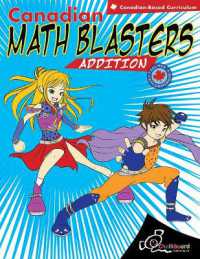Full Description
This book focuses on the interplay between pedagogy and technology, and their fusion for the advancement of smart learning environments. It discusses various components of this interplay, including learning and assessment paradigms, social factors and policies, emerging technologies, innovative application of mature technologies, transformation of curriculum and teaching behavior, transformation of administration, best infusion practices, and piloting of new ideas.
The book provides an archival forum for researchers, academics, practitioners and industry professionals interested and/or engaged in reforming teaching and learning methods by promoting smart learning environments. It also facilitates discussions and constructive dialogue among various stakeholders on the limitations of existing learning environments, the need for reform, innovative uses of emerging pedagogical approaches and technologies, and sharing and promoting best practices, leading to the evolution, design and implementation of smart learning environments.
Contents
1. A framework for designing an immersive language learning environment integrated with educational robots and IoT-based toys.- 2. A Framework of Learning Activity Design for Flow Experience in Smart Learning Environment.- 3. A Partner Robot for Decreasing Negative Concerns in Collaborative Reading.- 4. An Architecture for Mobile-based Assessment Systems in Smart Learning Environments.- 5. Analysis of Key Features in Conclusions of Student Reports.- 6. Artificial Intelligence and Commonsense.- 7. Can Fragmentation Learning Promote Students' Deep Learning in C Programming?.- 8. Challenges in recruiting and retaining participants for smart learning environment studies.- 9. Constructing a Hybrid Automatic Q&A System Integrating Knowledge Graph and Information Retrieval Technologies.- 10. Conversation Quest in MEGA World (Multiplayer Educational Game for All).- 11. Correlational Analysis of IRS Features and Learning Performance in Synchronous Sessions of an Online Course.- 12. Creating Smart Learning Environments with Virtual Worlds.- 13. Cultural Embodiment in Virtual Reality Education and Training: A Reflection on Representation of Diversity.- 14. Design of Online Teacher Training Mode: a Cognitive Apprenticeship approach.- 15. Diagnosis with Linked Open Data for Question Decomposition in Web-based Investigative Learning.- 16. Emarking: A collaborative platform to support feedback in higher education assessment.- 17. How Technologies Change Classrooms - A Case Study of K-12 Education in Sudan.- 18. Influence of Pre-service and In-service Teachers' Gender and Experience on the Acceptance of AR Technology.- 19. Integrating Enhanced Peer Assessment Features in Moodle Learning Management System.- 20. Investigation Report on the Status and Needs of Beijing Citizens for Lifelong Learning.- 21. Learning to Use the Fitness Equipment: Development and Evaluation of a Context-aware System with iBeacon Technology.- 22. Library Makerspaces and Connected Learning to Advance Rural Teen Creativity.- 23. Mobile-Based Teacher Professional Training: Influence Factor of Technology Acceptance.- 24. Personalized Adaptive Learning: An Emerging Pedagogical Approach Enabled by a Smart Learning Environment.- 25. Prototyping theory: Applying Design Thinking to adapt a framework for Smart Learning Environments inside organizations.- 26. Research on the Status Quo of Smart School Development in China.- 27. Towards the Enactment of Learning Situations Connecting Formal and Non-Formal Learning in SLEs.- 28. Using augmented reality in a beginning drawing course for design students.







